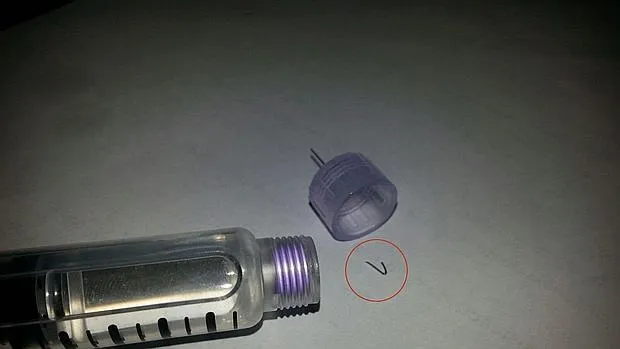Since the SAS changed distributor of the needles that it offers in the health centers to insulin -dependent people, those affected, about 16,000 of the 105,000 diabetics in Seville, they began to notice the poor quality of the material that not only brokebut also caused pain and bruises "because clearly breaches the protocol for assistance to this group."
This is denounced by Ana María Álvarez Hernández, the president of the Association for the Care and Defense of the Diabetic Child of Seville (Anadis) that will participate today in a demonstration convened by the Andalusian Federation that will end at the door of the Andalusian Parliament forAsk for the withdrawal of these needles, which are being provided to patients because "the economic criterion by the Ministry instead instead of the quality."
in the red circle, a piece of needle that departed when injecting into the insulin pen
Álvarez recounts that "bad needles" are detected because they are more weak and because they have less lubricant so than when entering the skin "it is already notice how it costs work to cross the epidermis."Since last year those affected began to suffer are claiming the SAS to withdraw them but without any success, so that many people have chosen to buy them in the pharmacy and pay for their full amount.A box, according to the president of Anadis costs 20 euros and brings 100 needles from which the patient needs 6 every day, so per month he has to buy two and pay, therefore, 40 euros.
But in addition, Álvarez denounces that the dispensing of the needles is made "on Wednesdays from 11 to 12 with what those who are working have to ask for permission and absent their position to collect them."
Another claim is the lack of nursing personnel in schools to meet the needs of children with diabetes.
"In most cases," says Álvarez, "one of the parents has to stop working to go to school to address the need to control glycemia and put insulin."
It also demands compliance with a resolution of the Health Commission that was signed in October 2015, which would increase the budgetary endowment to prevent and serve the diabetics collective that in Andalusia reaches 1,500,000 inhabitants, 15%of them insulin -dependent.
The president of the Andalusian Federation Saint Vicent, Francisco Pérez Barros, urges, for his part, that the diabetic patient assistance protocol is made because "the pre -established guidelines are not being fulfilled either in education or prevention."
Today will also be in the demonstration with the president of the Spanish Federation, Andoni Lorenzo Garmendia.The march begins at eleven in the morning at the barqueta and travels several streets from Resolana until you reach Parliament over two in the afternoon.
ABC wanted to know SAS's opinion about the demands of these diabetic patients and if you will meet their requests but the efforts have been opened.


